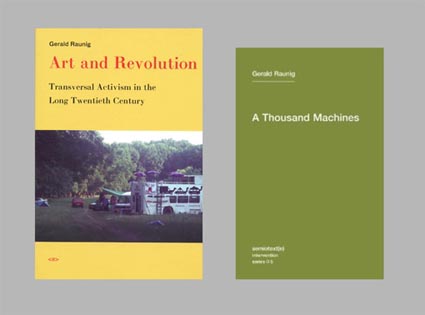
>> WORKSHOP
30
April 2010 |
|
"Artistic activism and activist art are not only directly persecuted by repressive state apparatuses because they operate in the neighboring zones of art and revolution. They are also marginalized by structural conservatisms in historiography and the art world. As a consequence of the reductive parameters of these conservatisms, such as rigid canons, fixation on objects and absolute field demarcations, activist practices are not even included in the narratives and archives of political history and art theory, as long as they are not purged of their radical aspects, appropriated and coopted into the machines of the spectacle. In order to break through mechanisms of exclusion like these, the as yet missing theorization of activist art practices not only has to avoid codification inside and outside the conventional canon, it also has to develop new concept clusters in the course of its emergence and undertake to connect contexts not previously noticed in the respective disciplines. For this philosophical and historiographical project of analyzing and problematizing the concatenation of revolutionary machines and art machines, a (dis-)continuity could be imagined, which persistently eludes every narrative of an origin. This is certainly a history of currents and bridges, outside the realm of flat notions of linear progress or a movement from one point to another. As the overlaps of art and revolution can not at all be described as a linear learning process, but have always engendered new attempts (and often similar "aberrations" as well) in new situations". (Gerald Raunig) Philosopher, art theoretician Gerald Raunig works at the Zürcher Hochschule der Künste (Departement Kunst und Medien, Vertiefung Theorie) and at the eipcp (European Institute for Progressive Cultural Policies); co-ordinator of the transnational eipcp research projects republicart, transform and Creating Worlds; habilitation and venia docendi at the Institute for Philosophy, University of Klagenfurt/A; member of the editorial board of the multilingual webjournal transversal and the Austrian journal for radical democratic cultural politics, Kulturrisse. Gerald Raunig presents to the students of NABA his research and
practice as well as his books “Art and Revolution, Transversal
Activism in the Long Twentieth Century” and his new book
“A Concise Philosophy of the Machine as Social Movement”,
both published by MIT Press. |
||
